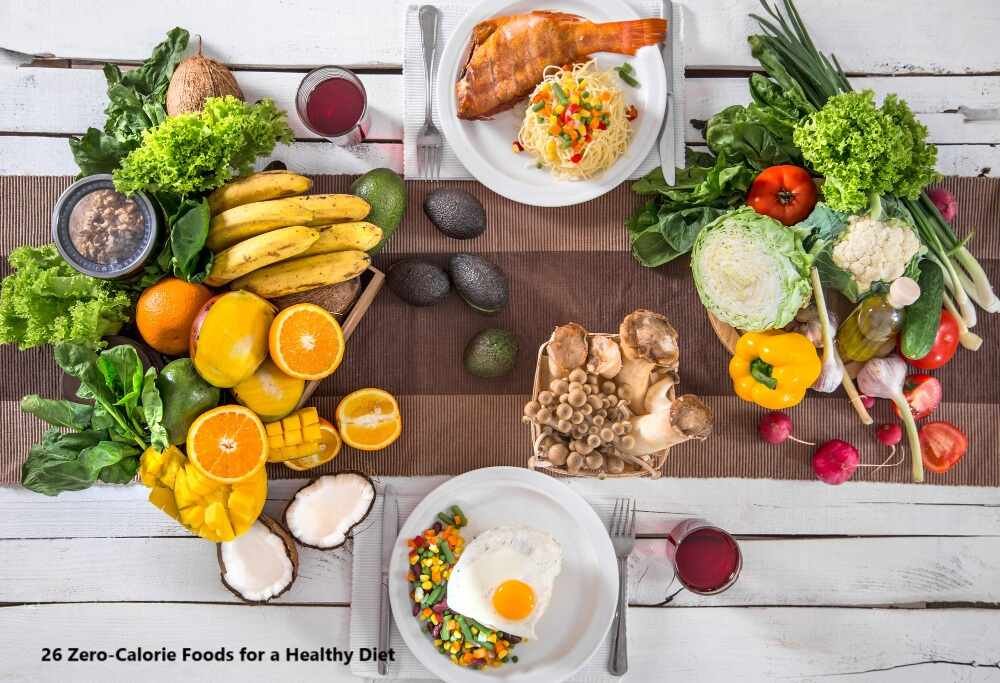Maintaining a healthy diet often means consuming foods that are low in calories but high in nutrients. Zero-calorie foods, while not literally free of calories, typically burn more energy during digestion than they provide, making them an excellent choice for weight loss and overall health. Here’s a list of 26 Zero-Calorie Foods for a Healthy Diet foods you can incorporate into your diet:
Cucumbers: The Ultimate Hydration Food
Cucumbers are a quintessential zero-calorie food, widely known for their hydrating properties and refreshing taste. With over 95% water content, cucumbers are one of the best foods for staying hydrated while keeping calorie intake minimal. A single cup of sliced cucumber contains just 16 calories, making it ideal for snacking or incorporating into meals.
In addition to being low in calories, cucumbers are packed with essential nutrients. They are a great source of vitamin K, which helps maintain bone strength and promotes proper blood clotting. The vegetable also contains vitamin C and potassium, both of which are important for immune function and heart health. The cucumber peel provides dietary fiber, which aids digestion and prevents constipation.
Cucumbers contain antioxidants, such as flavonoids and tannins, that reduce inflammation and combat oxidative stress. They also include cucurbitacins, bioactive compounds being studied for their potential role in cancer prevention.
This versatile vegetable can be consumed raw, added to salads, or blended into juices. A common favorite is infusing water with cucumber slices for a refreshing, detoxifying drink. Cucumbers can also be pickled for a tangy snack or used in dips like tzatziki.
Incorporating cucumbers into your diet not only aids weight management but also enhances hydration and provides key nutrients. With their crunchy texture and mild taste, cucumbers are a go-to for anyone looking to adopt a healthier lifestyle.
here is the number 2nd part for 26 Zero-Calorie Foods for a Healthy Diet:
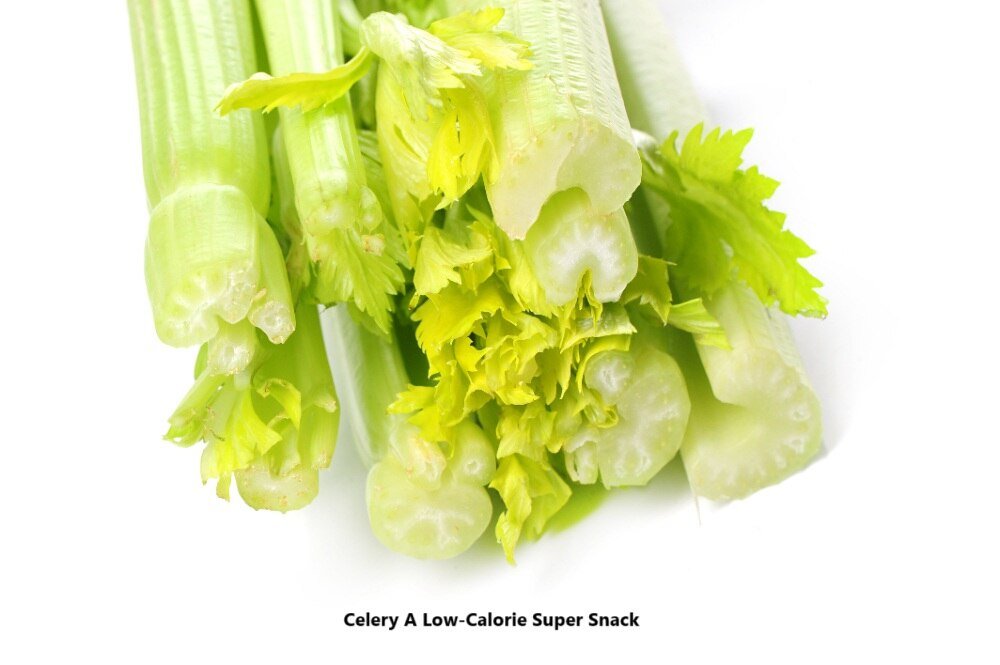
Celery: A Low-Calorie Super Snack
Celery is a go-to zero-calorie food often celebrated for its crunchy texture and hydrating properties. Each stalk of celery contains just about 6 calories, and its high water content (approximately 95%) helps you stay hydrated while feeling full. As a bonus, chewing celery burns calories, making it a truly calorie-neutral food.
Rich in nutrients, celery is a good source of vitamin K, which supports bone health and proper blood clotting. It also provides small amounts of vitamins A and C, as well as folate, potassium, and calcium. These nutrients collectively promote immunity, muscle function, and healthy skin.
Celery is also high in dietary fiber, which promotes gut health and regulates digestion. Its natural diuretic properties help flush out toxins and reduce water retention, making it ideal for combating bloating. Antioxidants like apigenin and luteolin further enhance celery’s health benefits by reducing inflammation and oxidative stress.
You can enjoy celery in many ways. Eat it raw with dips such as hummus or peanut butter for a healthy snack, toss it into salads for crunch, or include it in soups and stews. Celery juice has also gained popularity for its potential detoxifying effects.
Whether you’re looking for a hydrating snack, a low-calorie ingredient, or a way to support digestion, celery is an excellent choice. With its versatility and health benefits, celery is a must-have addition to any balanced diet.
Read More: 14 Zero Calorie Foods for Weight Loss
Spinach: A Nutrient Powerhouse
Spinach is a leafy green vegetable that packs a nutritional punch while being incredibly low in calories. One cup of raw spinach contains only 7 calories, making it one of the best zero-calorie foods for a healthy diet. Despite its low calorie count, spinach is loaded with vitamins, minerals, and antioxidants that support overall health.
Spinach is an excellent source of vitamin K, which is essential for bone health and blood clotting. It also provides high amounts of vitamin A, promoting healthy vision and immune fructi. Lettuce is one of the most popular zero-calorie foods, widely used in salads, sandwiches, and wraps. A cup of shredded lettuce contains approximately 5 calories, making it a favorite among those looking to lose weight or maintain a healthy diet. Lettuce is composed primarily of water, making it hydrating and low in energy density.
Though light in calories, lettuce provides essential nutrients. It is an excellent source of vitamin K, which supports bone health and proper blood clotting. Varieties such as romaine lettuce also contain small amounts of vitamin A, vitamin C, folate, and potassium, contributing to improved immunity, vision, and cardiovascular health.
Lettuce contains antioxidants, including beta-carotene, that help combat oxidative stress and promote skin health. It also provides dietary fiber, which aids digestion and contributes to a feeling of fullness, helping control appetite.
The versatility of lettuce makes it an easy addition to your diet. Use it as the base for salads, add it to sandwiches for crunch, or replace bread with large lettuce leaves to create low-carb wraps. It’s also an excellent addition to smoothies or green juices for an extra nutrient boost.
Lettuce is a highly versatile and nutritious food that can support your health goals without adding unnecessary calories. Whether you prefer crisp romaine or tender butterhead varieties, lettuce is an essential component of a balanced, low-calorie diet.
Read More: 14 Zero Calorie Foods for Weight Loss
Zucchini: A Versatile Low-Calorie Vegetable
Zucchini is a versatile squash that is a staple in low-calorie diets. With only 17 calories per cup of sliced zucchini, it is an excellent option for those looking to stay full without consuming excess calories. Its mild flavor and tender texture make it suitable for various recipes, from stir-fries to pasta alternatives.
Zucchini is rich in essential nutrients. It provides vitamin C, which supports immune function and skin health, as well as small amounts of vitamin A, potassium, and manganese. Additionally, zucchini contains antioxidants like lutein and zeaxanthin, which protect eye health by reducing the risk of macular degeneration.
One of zucchini’s standout features is its high water and fiber content. These properties help improve digestion, promote hydration, and keep you feeling full longer, which can aid in weight loss. Zucchini also has a low glycemic index, making it a suitable choice for people managing blood sugar levels.
Zucchini can be prepared in countless ways. It can be spiralized into “zoodles” as a healthy pasta alternative, grilled as a side dish, or used in soups, casseroles, and even baked goods. Its mild flavor also makes it an excellent ingredient for smoothies or dips.
Including zucchini in your diet is a simple way to enjoy a nutrient-packed vegetable while keeping calories in check. Its versatility and health benefits make it a must-have for anyone focused on eating clean and staying healthy.
(26 Zero-Calorie Foods for a Healthy Diet) next part:
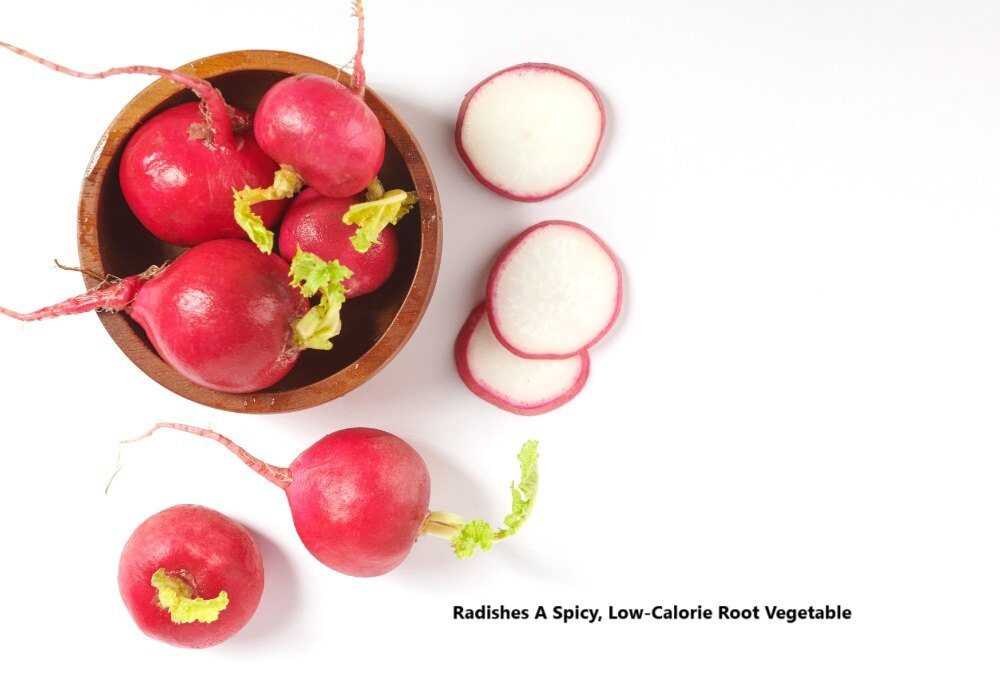
Asparagus: A Nutrient-Dense Spring Favorite
Asparagus is a nutrient-dense vegetable that offers numerous health benefits with minimal calories. A cup of asparagus contains just 27 calories, making it an ideal choice for weight-conscious individuals. It’s often celebrated for its unique flavor and versatility in cooking.
Asparagus is a powerhouse of vitamins and minerals. It is particularly rich in vitamin K, which promotes bone health and proper blood clotting. It also provides folate, essential for DNA repair and cell growth, as well as vitamins A and C, which support immunity and skin health. Asparagus is also a natural source of chromium, a mineral that helps regulate blood sugar levels.
This vegetable is loaded with antioxidants, including glutathione, which helps detoxify the body and protect against free radical damage. Asparagus.
Radishes: A Spicy, Low-Calorie Root Vegetable
Radishes are an often-overlooked zero-calorie food that is perfect for adding crunch and a peppery kick to your meals. With only 19 calories per cup, they are an excellent addition to any healthy diet. Radishes are composed of over 90% water, making them hydrating and light.
These root vegetables are rich in vitamin C, which boosts immunity and promotes healthy skin. They also contain small amounts of potassium, calcium, and magnesium, all of which are essential for maintaining strong bones and a healthy heart. Radishes are also a good source of antioxidants such as anthocyanins, which have anti-inflammatory and cancer-fighting properties.
Radishes are high in fiber, which aids in digestion, supports gut health, and keeps you feeling full longer. They also contain natural compounds called glucosinolates, which may help protect against certain types of cancer.
Radishes can be enjoyed in a variety of ways. Eat them raw in salads or as a crunchy snack, pickle them for a tangy treat, or roast them for a milder flavor. They can also be grated and added to slaws or sandwiches for an extra crunch.
Including radishes in your diet is a simple way to enjoy a flavorful, nutrient-rich food while keeping your calorie count low. Their versatility and health benefits make them an excellent choice for anyone seeking to maintain a healthy lifestyle.
Read More: 14 Zero Calorie Foods for Weight Loss
Tomatoes: A Juicy and Nutrient-Dense Option
Tomatoes are a low-calorie food that is both delicious and packed with nutrients. A cup of chopped tomatoes contains just 18 calories, making them a guilt-free addition to salads, sauces, and snacks. With their vibrant red color and juicy texture, tomatoes are as versatile as they are nutritious.
Tomatoes are a fantastic source of vitamin C, which supports immunity and skin health, and vitamin A, which promotes good vision. They also provide potassium, which helps regulate blood pressure, and folate, which is essential for DNA repair and cell growth. One of their standout compounds is lycopene, a powerful antioxidant that gives tomatoes their red color and may help reduce the risk of heart disease and certain cancers.
Tomatoes are hydrating due to their high water content (around 94%) and contain dietary fiber, which aids digestion and promotes a feeling of fullness. They are also low in sugar, making them suitable for those managing blood sugar levels.
Tomatoes can be enjoyed in countless ways. Eat them raw in salads, slice them for sandwiches, or roast them for a sweet and tangy side dish. They’re also the base for sauces, soups, and salsas, making them a staple in many cuisines.
Incorporating tomatoes into your diet is an easy way to enjoy a flavorful, nutrient-packed food while keeping your calorie intake low. Their versatility and health benefits make them a must-have in any kitchen.
Broccoli: A Nutrient Powerhouse
Broccoli is a superfood that deserves a spot in every healthy diet. With just 31 calories per cup of raw broccoli, it’s an incredibly nutrient-dense option that supports weight loss and overall health. This cruciferous vegetable is known for its vibrant green color and numerous health benefits.
Broccoli is an excellent source of vitamins C and K, which boost immunity and support bone health. It’s also rich in folate, potassium, and fiber, all of which promote healthy digestion and cardiovascular health. Additionally, broccoli contains compounds like sulforaphane, which have been studied for their potential cancer-fighting properties.
The high fiber content in broccoli aids in digestion, helps maintain blood sugar levels, and keeps you feeling full longer, making it a perfect food for weight management. Its antioxidants, including lutein and beta-carotene, support eye health and reduce oxidative stress.
Broccoli can be prepared in various ways. Eat it raw with dips, steam it as a side dish, or roast it for a crispy texture. It’s also a great addition to soups, stir-fries, and casseroles. Blending broccoli into smoothies is another creative way to boost your nutrient intake.
Including broccoli in your meals is an easy way to enhance your diet with a low-calorie, nutrient-rich food. Its versatility, taste, and health benefits make it a favorite among nutrition enthusiasts.
Read More: 14 Zero Calorie Foods for Weight Loss
Cauliflower: The Versatile Low-Calorie Superstar
Cauliflower is a versatile vegetable that has gained popularity as a low-calorie alternative to high-carb foods. With just 25 calories per cup of raw cauliflower, it’s perfect for those looking to cut calories without sacrificing flavor or nutrition.
Cauliflower is rich in vitamins C and K, which boost immunity and support bone health. It also provides folate, which is essential for cell growth and DNA repair, as well as small amounts of potassium and magnesium. This cruciferous vegetable contains antioxidants like glucosinolates and isothiocyanates, which have been linked to cancer prevention.
One of cauliflower’s biggest appeals is its versatility. It can be roasted, mashed, steamed, or even blended into soups. Many people use it as a low-carb substitute for rice, pizza crust, or even mashed potatoes. Its neutral flavor allows it to absorb spices and sauces, making it a favorite for creative, healthy recipes.
Cauliflower is also high in fiber, which supports digestion and helps maintain a healthy weight. Its low glycemic index makes it suitable for people managing blood sugar levels.
Adding cauliflower to your diet is an easy way to enjoy a nutrient-dense, low-calorie food that supports overall health. Its versatility and mild flavor make it a fantastic addition to any meal plan.
(26 Zero-Calorie Foods for a Healthy Diet) next part:
Cabbage: A Cruciferous Low-Calorie Favorite
Cabbage is an excellent zero-calorie food, offering just 22 calories per cup of shredded cabbage. This cruciferous vegetable is packed with nutrients and adds a satisfying crunch to meals while keeping calories in check. With its affordability and versatility, cabbage is a staple in many healthy diets.
Cabbage is a rich source of vitamin K, which supports bone health and proper blood clotting, and vitamin C, which boosts immunity and aids collagen production for healthy skin. It also contains small amounts of folate, potassium, and manganese, essential for cell function and cardiovascular health. Red cabbage, in particular, contains anthocyanins, powerful antioxidants that help reduce inflammation and promote heart health.
The fiber content in cabbage aids digestion, prevents constipation, and promotes a feeling of fullness, making it a great choice for weight loss. Additionally, cabbage contains glucosinolates, sulfur-containing compounds that have been linked to cancer prevention.
Cabbage is incredibly versatile in the kitchen. Use it raw in salads and slaws, ferment it into sauerkraut or kimchi, or cook it into soups and stir-fries. Steamed or sautéed cabbage can serve as a flavorful side dish, while stuffed cabbage leaves make a hearty, low-calorie meal.
Incorporating cabbage into your diet is a simple way to enjoy a nutrient-packed, low-calorie food. Its versatility, crunch, and health benefits make it a great addition to any meal plan.
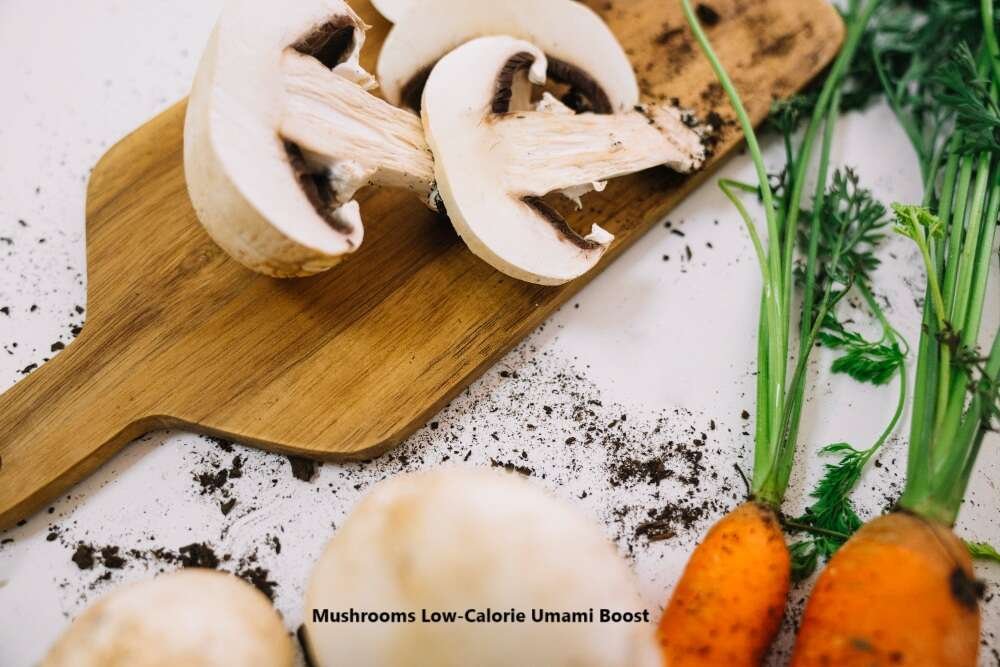
Mushrooms: Low-Calorie Umami Boost
Mushrooms are a flavorful, low-calorie food that adds depth and richness to a variety of dishes. A cup of raw mushrooms contains just 15 calories, making them an excellent choice for weight management. With their savory umami flavor and versatile texture, mushrooms are a favorite in both plant-based and omnivorous diets.
Mushrooms are a good source of essential nutrients such as B vitamins (riboflavin, niacin, and pantothenic acid), which support energy production and brain health. They also provide selenium, a powerful antioxidant that helps protect cells from damage, and small amounts of potassium, which helps regulate blood pressure.
One of mushrooms’ unique qualities is their ability to produce vitamin D when exposed to sunlight, making them one of the few plant-based sources of this crucial nutrient. Mushrooms also contain beta-glucans, compounds known for their immune-boosting properties.
These fungi are incredibly versatile. Sauté them as a side dish, add them to soups and stews, or grill them as a meat substitute in burgers and sandwiches. Their meaty texture also makes them perfect for stuffing or blending into sauces.
Including mushrooms in your diet not only enhances flavor but also provides a host of health benefits. Their low-calorie count, nutrient density, and versatility make them a fantastic addition to a balanced, healthy eating plan.
Read More: 14 Zero Calorie Foods for Weight Loss
Bell Peppers: A Sweet, Low-Calorie Delight
Bell peppers are vibrant, flavorful vegetables that are as nutritious as they are colorful. A cup of chopped bell peppers contains just 39 calories, making them a low-calorie yet nutrient-dense addition to your meals. Available in red, yellow, orange, and green varieties, bell peppers brighten up dishes with their sweetness and crunch.
Bell peppers are an excellent source of vitamin C, providing more than twice the daily recommended amount in just one serving. This vitamin is essential for immune health, skin repair, and collagen production. They also contain vitamin A, which supports vision, and small amounts of potassium and folate, which are vital for heart health and cell function. These peppers are rich in antioxidants, including beta-carotene, lutein, and zeaxanthin, which promote eye health and protect against oxidative damage.
(26 Zero-Calorie Foods for a Healthy Diet) next part:
Carrots: A Sweet, Low-Calorie Favorite
Carrots are a naturally sweet and crunchy vegetable that’s perfect for snacking and meal prep. With just 25 calories per medium carrot, they’re an excellent low-calorie option that’s packed with nutrients. Their vibrant orange color is due to beta-carotene, an antioxidant that converts to vitamin A in the body.
Vitamin A in carrots is crucial for maintaining healthy vision, especially night vision. Carrots also provide significant amounts of fiber, which aids digestion and promotes a feeling of fullness, making them ideal for weight management. Additionally, they contain small amounts of potassium, which helps regulate blood pressure, and vitamin K, which supports bone health.
Carrots are versatile and can be eaten raw, roasted, steamed, or added to soups and stews. Grated carrots are a wonderful addition to salads, and their natural sweetness makes them an excellent ingredient in healthy baking recipes, such as muffins or carrot cake.
Another key benefit of carrots is their antioxidant content, which helps fight inflammation and oxidative stress in the body. Studies have also suggested that regular consumption of carrots may reduce the risk of certain types of cancer, thanks to compounds like carotenoids and polyacetylenes.
Whether you enjoy them as a snack with hummus, cooked in savory dishes, or blended into smoothies, carrots are a low-calorie, nutrient-rich food that supports overall health. Their sweet taste and versatility make them a favorite for all ages.
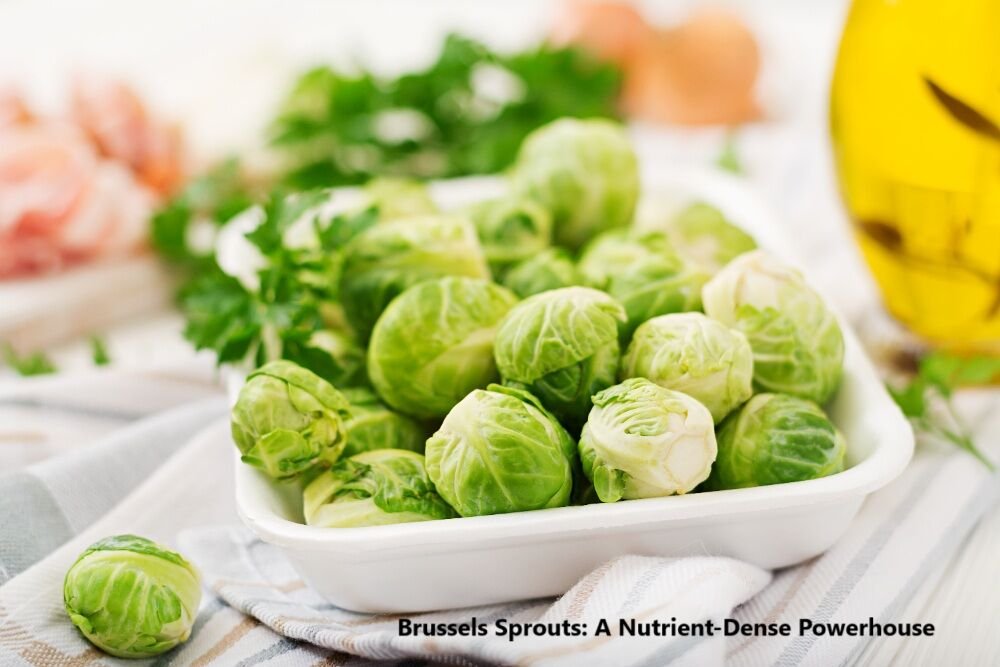
Brussels Sprouts: A Nutrient-Dense Powerhouse
Brussels sprouts are a cruciferous vegetable that offers an impressive array of nutrients with minimal calories. One cup of cooked Brussels sprouts contains just 38 calories, making them a fantastic choice for those looking to maintain or lose weight. These small, cabbage-like vegetables are rich in flavor and packed with health benefits.
Brussels sprouts are an excellent source of vitamins C and K, which support immunity, skin health, and bone strength. They also provide folate, fiber, and small amounts of manganese and potassium. Additionally, Brussels sprouts are high in antioxidants, such as kaempferol, which help reduce inflammation and protect cells from damage.
Fiber in Brussels sprouts aids digestion, promotes gut health, and helps you feel full longer. They also contain glucosinolates, sulfur-containing compounds that have been linked to cancer prevention. Regular consumption of cruciferous vegetables like Brussels sprouts may lower the risk of chronic diseases.
These versatile vegetables can be roasted, steamed, sautéed, or added to casseroles. Roasting Brussels sprouts with olive oil and spices enhances their natural sweetness and creates a crispy texture. They also pair well with other vegetables, grains, and proteins. Brussels sprouts are a nutrient-packed, low-calorie food that supports overall health and weight management. Their hearty texture and robust flavor make them an excellent addition to any meal plan.
Read More: 14 Zero Calorie Foods for Weight Loss
Beets: A Vibrant, Low-Calorie Superfood
Beets are a vibrant, nutrient-dense root vegetable that adds a pop of color and flavor to your meals. With only 58 calories per cup of cooked beets, they’re a low-calorie food that’s rich in essential nutrients and antioxidants.
Beets are an excellent source of folate, which is essential for DNA repair and cell growth. They also provide manganese, potassium, and vitamin C, which support immune function, heart health, and nerve function. The high nitrate content in beets has been linked to improved blood flow, lower blood pressure, and enhanced athletic performance.
(26 Zero-Calorie Foods for a Healthy Diet) next part:
Watermelon: A Hydrating Low-Calorie Treat
Watermelon is a refreshing and hydrating fruit that’s perfect for hot days or as a post-workout snack. With only 46 calories per cup, watermelon is a low-calorie food that’s packed with water and nutrients. Its high water content (about 92%) makes it an excellent choice for hydration.
This juicy fruit is rich in vitamins A and C, which promote healthy skin, boost immunity, and improve vision. Watermelon also contains potassium, which helps regulate blood pressure, and small amounts of magnesium, important for muscle and nerve function. The red flesh of watermelon is loaded with lycopene, a powerful antioxidant known to reduce the risk of heart disease and certain types of cancer.
Watermelon is naturally sweet and satisfies sugar cravings without adding excess calories. It’s also low in fat and sodium, making it a heart-healthy option. The fiber in watermelon aids digestion, while its hydrating properties keep you feeling refreshed and full.
Watermelon is incredibly versatile. Enjoy it fresh as a snack, blend it into smoothies or juices, or use it as a base for fruit salads. Some creative uses include grilling watermelon slices for a smoky flavor or pairing it with feta cheese and mint for a savory-sweet salad.
Adding watermelon to your diet not only helps with hydration but also provides essential vitamins and antioxidants. Its sweet taste, low calorie count, and health benefits make it a delightful addition to any healthy eating plan.
(26 Zero-Calorie Foods for a Healthy Diet) next part:
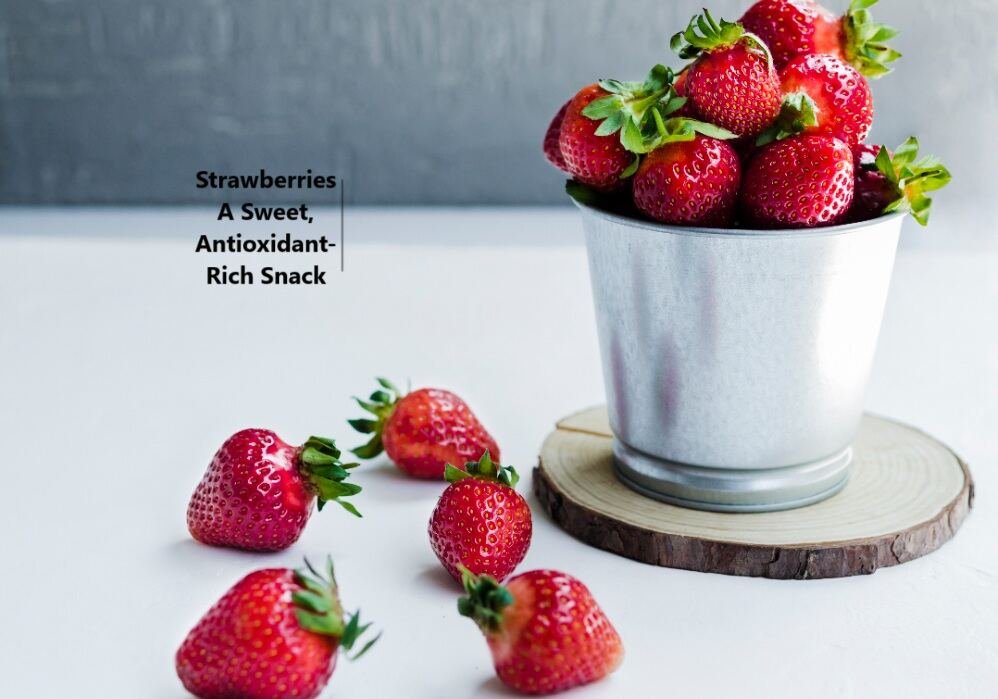
Strawberries: A Sweet, Antioxidant-Rich Snack
Strawberries are a naturally sweet, low-calorie fruit that’s packed with flavor and nutrients. A cup of fresh strawberries contains only 49 calories, making them an ideal snack or dessert for those watching their calorie intake.
Strawberries are an excellent source of vitamin C, which supports immune health, skin repair, and collagen production. They also contain manganese, which aids metabolism and bone health, and small amounts of potassium and folate. Strawberries are rich in antioxidants, particularly anthocyanins, which give them their vibrant red color and help reduce inflammation.
The fiber content in strawberries aids digestion, supports gut health, and helps you feel full longer. They are naturally low in sugar, making them suitable for people managing blood sugar levels. Studies have also shown that regular consumption of strawberries may improve heart health by lowering cholesterol and blood pressure.
Strawberries are incredibly versatile. Enjoy them fresh as a snack, add them to smoothies, or slice them onto oatmeal or yogurt. They’re also perfect for making healthy desserts like fruit salads, sorbets, or dipped in dark chocolate.
Incorporating strawberries into your diet is a delicious way to boost your intake of vitamins and antioxidants while keeping calories low. Their natural sweetness and health benefits make them a favorite among those looking to eat healthier.
Read More: 14 Zero Calorie Foods for Weight Loss
Blueberries: A Nutrient-Packed Superfood
Blueberries are small but mighty, offering a powerful nutritional punch with just 57 calories per cup. These sweet and tangy berries are not only low in calories but also high in antioxidants and essential nutrients, making them a superfood for a healthy diet.
Blueberries are a rich source of vitamin C, which supports immune function and skin health, and vitamin K, which is crucial for bone strength. They also provide manganese, essential for energy production and metabolism. Blueberries are particularly known for their high levels of antioxidants, such as anthocyanins, which help reduce inflammation and protect against oxidative stress. The fiber content in blueberries promotes healthy digestion, supports gut health, and helps regulate blood sugar levels.
Apples: A Crunchy, Low-Calorie Snack
Apples are one of the most popular and accessible fruits, loved for their natural sweetness and satisfying crunch. A medium-sized apple contains about 95 calories, but its high fiber and water content make it filling and ideal for weight management.
Apples are a great source of dietary fiber, particularly in the skin, which aids digestion, regulates blood sugar levels, and keeps you feeling full longer. They are also rich in vitamin C, which boosts immunity and promotes skin health, and small amounts of potassium, which supports heart function and muscle health. Apples also contain antioxidants such as quercetin and catechins, which help reduce inflammation and protect against chronic diseases.
One of the best things about apples is their versatility. Enjoy them raw as a snack, slice them into salads, or bake them for a warm, healthy dessert. Apples can also be blended into smoothies or used to make sugar-free applesauce. Pairing apples with a source of protein, like peanut butter or cheese, creates a balanced snack that keeps you energized. Including apples in your diet provides a convenient way to satisfy sweet cravings while benefiting from their nutritional value. Their portability, variety, and health benefits make apples a perfect addition to any healthy eating plan.
(26 Zero-Calorie Foods for a Healthy Diet) next part:
Grapefruit: A Tangy, Metabolism-Boosting Fruit
Grapefruit is a tart and tangy fruit that’s well-known for its potential to boost metabolism and aid in weight loss. Half a grapefruit contains just 37 calories, making it a low-calorie choice packed with health benefits.
Grapefruit is an excellent source of vitamin C, which strengthens the immune system and supports collagen production for healthy skin. It also provides small amounts of vitamin A, potassium, and folate. The high water content of grapefruit (around 88%) helps keep you hydrated and full, while its fiber content aids digestion and promotes gut health.
This fruit is rich in antioxidants like lycopene (especially in pink and red varieties), which helps protect against heart disease and certain cancers. Additionally, studies suggest that compounds in grapefruit may improve insulin sensitivity and help regulate blood sugar levels, making it a good option for people with diabetes.
Grapefruit can be eaten on its own, added to salads, or blended into juices and smoothies. For a flavorful twist, sprinkle a little cinnamon or chili powder on top. Its refreshing taste also pairs well with seafood and avocado in savory dishes.
Including grapefruit in your diet can help enhance metabolism, boost hydration, and provide a host of essential nutrients. Its unique flavor and versatility make it a delicious and healthful addition to your meals.
Read More: 14 Zero Calorie Foods for Weight Loss
Watercress: A Peppery, Nutrient-Dense Green
Watercress is a leafy green vegetable that packs a powerful nutritional punch in a tiny calorie count. One cup of watercress contains just 4 calories, making it one of the most nutrient-dense foods per calorie.
This green is an excellent source of vitamins A, C, and K. Vitamin A promotes healthy skin and vision, vitamin C boosts the immune system, and vitamin K supports bone health and proper blood clotting. Watercress also provides small amounts of calcium, magnesium, and potassium, which are vital for muscle and nerve function. Its antioxidants, including beta-carotene and lutein, help reduce inflammation and protect against chronic diseases.
Watercress is high in nitrates, which may improve cardiovascular health by reducing blood pressure and enhancing athletic performance. Its slightly peppery taste adds a unique flavor to dishes, making it a favorite for salads and garnishes.
This versatile green can be eaten raw in salads, blended into smoothies, or added to soups and stir-fries. It pairs well with other leafy greens or can be used as a fresh topping for sandwiches and wraps.
Incorporating watercress into your diet is a simple way to enjoy a low-calorie, nutrient-rich food that supports overall health. Its vibrant flavor and exceptional health benefits make it a must-try for anyone seeking a healthier lifestyle. (26 Zero-Calorie Foods for a Healthy Diet) next part:
Read More: 14 Zero Calorie Foods for Weight Loss
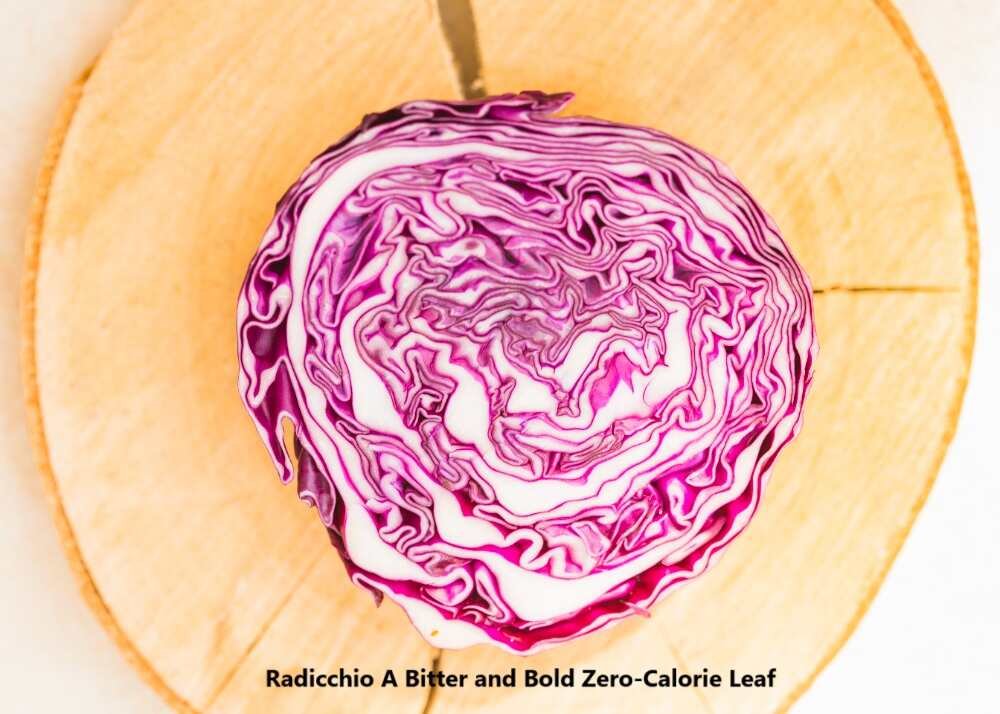
Radicchio: A Bitter and Bold Zero-Calorie Leaf
Radicchio is a strikingly beautiful leafy vegetable with a slightly bitter taste. A cup of raw radicchio contains only 9 calories, making it a fantastic choice for those looking to maintain a low-calorie diet while adding color and texture to meals.
Rich in antioxidants, radicchio provides a healthy dose of vitamin K, which supports bone health and blood clotting. It also contains vitamin C, promoting immunity and skin health, and small amounts of zinc and copper, which are important for overall metabolic function. Radicchio’s red pigment is due to anthocyanins, antioxidants that help reduce inflammation and combat oxidative stress.
The fiber in radicchio aids digestion and helps regulate blood sugar levels, while its slightly bitter flavor is known to stimulate digestive enzymes and improve gut health. These properties make it a great addition to meals, especially for those looking to support their digestive system.
Radicchio can be used in a variety of dishes. Add it to salads for a splash of color, grill it to bring out its natural sweetness, or sauté it with garlic and olive oil for a flavorful side dish. Its bold flavor also complements cheese, nuts, and citrus fruits in more complex recipes.
Including radicchio in your diet adds not only a vibrant visual appeal but also significant nutritional benefits. Its unique taste and versatility make it an exciting, healthful addition to any meal plan for 26 Zero-Calorie Foods for a Healthy Diet.

